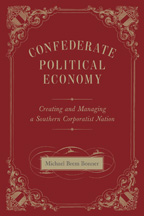In Confederate Political Economy, Michael Bonner suggests that the Confederate nation was an expedient corporatist state—a society that required all sectors of the economy to work for the national interest, as defined by a partnership of industrial leaders and a dominant government. As Bonner shows, the characteristics of the Confederate States’ political economy included modern organizational methods that mirrored the economic landscape of other late nineteenth-century and early-twentieth-century corporatist governments.
Southern leaders, Bonner argues, were slave-owning agricultural capitalists who sought a counterrevolution against northern liberal capitalism. During secession and as the war progressed, they built and reinforced Confederate nationalism through specific centralized government policies. Bolstered by the Confederate constitution, these policies evolved into a political culture that allowed for immense executive powers, facilitated an anti-party ideology, and subordinated individual rights. In addition, the South’s lack of industrial capacity forced the Confederacy to pursue a curious manufacturing policy that used both private companies and national ownership to produce munitions. This symbiotic relationship was just one component of the Confederacy’s expedient corporatist state: other wartime policies like conscription, the domestic passport system, and management of southern railroads also exhibited unmistakable corporatist characteristics. Bonner’s probing research and new comparative analysis expand our understanding of the complex organization and relationships in Confederate political and economic culture during the Civil War.
1. Political Culture
2. Corporatist Industrial Policy in the Confederacy, Part One
Private Munitions Industries
3. Corporatist Industrial Policy in the Confederacy, Part Two
State-Owned Munitions Industries
4. The Confederate System
Michael Brem Bonner is assistant professor of history at the University of South Carolina at Lancaster.
